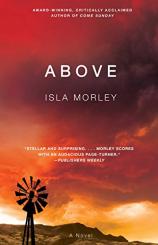Reading Group Guide
Discussion Questions
Above

1. The book opens with Blythe already held captive by Dobbs. What effect did this have on your understanding of Blythe and her life before being kidnapped? Why do you think the author chose to reveal Blythe’s early life through flashbacks, and in small pieces?
2. Like with Blythe, we come to understand Dobbs and his psychosis over time. How does Dobbs compare to other kidnappers in real life, or in fiction? Were there aspects of his character that surprised you? How come?
3. Blythe characterizes Dobbs and his madness on page 36 as “a kind of craziness you can’t tell from the outside. Only the whistle gives him away. There’s harm in that whistle…” Do you agree with this identification of Dobbs, and of psychosis generally? Do you think it’s something that can really be hidden, or just missed, not noticed?
4. On page 27, Blythe says, “I give myself the small task of finding the sweater, believing if I can do this, I will be able to do greater things when the time comes.” What other techniques does Blythe use to cope with and negotiate her way through being a captive? How does she adapt to her unbelievably difficult situation?
5. While Blythe is held captive in the silo, she frequently imagines a monster, always hidden out of sight or in the darkness. What does the monster mean to Blythe? Does it have a specific symbolism? Is it just her imagination?
6. What does memory mean to Blythe, during her captivity? How is it a double-edged sword for her, making her time both easier and more difficult?
7. Over time, Blythe begins to focus less on escaping her situation and more on making her own day-to-day life tolerable. How does this change come about, and why? Is it part of Dobbs’ manipulation or Blythe’s coping mechanisms? How does the arrival of first Charlie, and then Adam, affect this shift?
8. Blythe’s first pregnancy, then Charlie and finally, Adam, change everything about her situation. Discuss some of the ways in which they alter Blythe’s priorities, goals and life in general? How do they each affect the dynamic between Dobbs and Blythe?
9. As Adam grows up Blythe must make choices about how best to raise him --- and decides primarily to ‘’play along’’ with Dobbs’s story. What do you make of this decision? What do you think led Blythe to this choice? What effect does this have on Adam?
10. What are the first hints that Dobbs’ story might not be entirely false? When did you begin to suspect that the world outside of the silo wasn’t as Blythe left it? When Blythe and Adam finally escape, what was your reaction to the reality of the world outside? How did the author make this twist so effective?
11. Right before Blythe and Adam leave the silo, Blythe reflects on her time there and says, “You can’t see change; you can only feel it.” (p.229) What do you think this means? Do you agree that real change is something that you feel more than see, or touch?
12. As Blythe and Adam find their way in the strange and terrifying landscape outside their captivity, what surprised you most about Blythe’s reactions and choices? Do you think you would act differently in her place? Is it possible for you to imagine yourself in Blythe’s shoes?
13. Discuss with your group the change in Blythe’s attitude towards Dobbs after her escape --- how does it evolve, and why? Were you shocked by the feelings she comes to have for him as the book ends? Would you characterize it as sympathy, or something different?
14. The explanation for why the world is the way it is, i.e. what has happened since Blythe was kidnapped, unfolds slowly, and only after Blythe and Adam have been free for many days --- what effect did this have on you as a reader? Did your confusion help you identify with Blythe?
15. Read Blythe’s conversation with Ginny on pages 379-382: How is Blythe’s relationship to the post-apocalyptic world a metaphor for her struggles readapting to the world after escaping such trauma? Which of Blythe’s struggles have to do with the changed world, and which are particular to her kidnapping and captivity? How do these intersect?
16. On page 420, Blythe says, “I am the one who has swallowed the darkness.” What does she mean by this? What are some of the difficulties that Blythe has adapting to freedom? Why do you think she deals with things the way she does?
17. Blythe’s evolving understanding of freedom becomes a major theme in this novel. What does freedom mean to you, and what does it mean to Blythe? Can a person in captivity ever be considered “free”? And conversely, in what ways are the people “above” captives?
18. At the end of the book, Blythe says of Dobbs, “Maybe forgiving him a little at a time is the only way I’m ever going to be free of him.” Discuss this idea with your group: Can you imagine forgiving Dobbs for all he did? Do you think Blythe is right that forgiveness is the only way for her to move forward? Were you surprised at how far she has come from the beginning of the book?
19. One of the most important symbols of the book is Blythe’s grandfather’s watch and its inscription. What does this mean for Blythe during her time in captivity, and how does its meaning evolve for her over the course of the book?
20. Home is a very important concept to Blythe. What does home mean to Blythe when she is in captivity, and how does it change during that period, especially after her escape?
Enhance your Book Club
1. Blythe’s experience being kidnapped and held captive, while fictional, is similar to scenarios that have occurred in real life. One remarkable example of this is the story of Jaycee Dugard, who was kidnapped at age 11 and held captive for 18 years. Her memoir, A STOLEN LIFE, tells the story of this time, and her life afterwards. Read it with your book club and discuss how it resonates with ABOVE. What are some of the similarities between Jaycee’s real experience and Blythe’s fictional one? What are some of the differences? How did they cope with their captivity and adjust to life afterwards?
2. The second half of ABOVE deals with a world radically altered by an apocalyptic event. There are many examples of post-apocalyptic fiction in contemporary writing --- choose a book (or a movie) that deals with a post-apocalyptic scenario, and present it to your group: What is similar between the example you chose and ABOVE? What’s different? How do people cope with each seemingly impossible situation? What remnants of society remain? Which are gone forever? What do you think holds our attention about these scenarios? What can we learn from them about our own situation? Some good examples of apocalyptic literature you might try: RIVERS by Michael Farris, WOOL by Hugh Howey, THE ROAD by Cormac McCarthy and WHITE HORSE by Alex Adams.
3. Continue the story! Jump five years into the future, and write what you imagine is happening in the world of Blythe and Adam, from either of their points of view. Where are they? Who are they with? Be creative, and write as much as you want --- a few paragraphs, or a few chapters! Share with your group --- what did you imagine similarly? What surprised you about each other’s stories?
Above
- Publication Date: October 7, 2014
- Genres: Dystopian, Fiction, Psychological Suspense, Psychological Thriller, Suspense, Thriller
- Paperback: 384 pages
- Publisher: Gallery Books
- ISBN-10: 1476735638
- ISBN-13: 9781476735634








